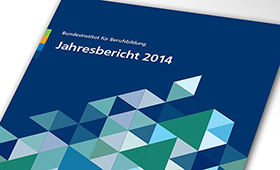President Esser: “Dual system requires further development”
BIBB’s 2014 annual report is published
24/2015 | Bonn, 02.07.2015

How must vocational education and training respond to the continuous trend towards academization? How do inclusion, internationalization and digitalization of the working environment effect vocational education and training? And what does the increasing heterogeneity - the differences in personal de-velopment and knowledge training can build on - mean for the future of dual vocational education and training? Vocational education and training must prove its worth on a number of fronts in changing underlying conditions. The 2014 annual report of the Federal Institute for Vocational Education and Training (BIBB) provides information about analyses, data and suggestions regarding the development of the dual system. “Germany will also need the dual system in the future and that is the reason for its further development”, emphasized BIBB president Friedrich Hubert Esser. “Viable solutions are called for to improve the chances of young people gaining a placement, to offer an attractive career path within the dual training system to those leaving degree courses without completing their studies and to overcome the problems related to suitability and the changing requirements in vocational education and training.”
The BIBB annual report offers an insight by way of examples into the key areas of the research, devel-opment and consultancy work undertaken by the BIBB over the past year. It contains a range of articles and analyses regarding projects and services which the BIBB has produced for academia, policy work and use in practice, and highlights starting points for future work:
- 33 self-financed and third-party funded research projects have provided important structural and development information. The results of this are reflected, for example, in the Data Report and the Report on Vocational Education and Training and in an increasing number of peer-reviewed publications. In 2014 a foundation junior professorship for sociological vocational research was established and an appointment made to the post at the University of Cologne for the first time.
- Important points regarding the continued development of dual education and training were set out in the career orientation programme and in the results of the pilot projects "Heterogeneity" and “Vocational training for sustainable development" which were overseen by the BIBB.
- Since 1 August 2014, training has been available in the new occupation of “office manager” - this is one example of the initial and advanced training regulations which it has been possible to initiate in the past year.
- Evaluations of the BIBB Vocational Education and Training 2014 Expert Monitor reveal, for ex-ample, that training specialists regard those leaving degree courses without completing their studies as an opportunity for the dual system. The specialists, in particular, regard it as essential that contact is encouraged and facilitated between those leaving degree courses without com-pleting their studies and interested businesses, and in this regard favour models at a national level in collaboration with stakeholders on the ground.
- Analyses of the situation for young people with migrant backgrounds on the training market highlight approaches for action. BIBB studies make it clear, for example, that the transition to dual vocational training is the critical hurdle for young migrants. There is no discernible difference in training success, under the same conditions, between young people with and without a migrant background. Strategies for improved access and support during the course of education and training is therefore of particular importance.
- BIBB surveys have shown that professional development training is worthwhile - and why men rate the benefits more strongly than women.
- The central office for international cooperation in vocational education which was instigated in the BIBB in 2013 will, from now on, operate under the name of “GOVET – German Office for In-ternational Cooperation in Vocational Education and Training". The annual report presents the results and perspectives from a variety of networking and projects at an international level.
- The BIBB is assisting in and supporting the implementation of the Recognition Act. For example, over one million visitors have used the recognition portal. This is more than twice as many people than in the previous year.
- The internet presence, which is the central component of the BIBB information provision, has undergone a comprehensive relaunch. An up to date internet presence can be found at www.bibb.de and meets the requirements of current user habits.
- The BIBB congress in Berlin in 2014 on the subject of “permeability” achieved lots of exposure outside Germany with 800 participants from over 30 countries.
The annual Report (German language only) can be downloaded from the BIBB website at www.bibb.de/jahresbericht. A downloadable cover illustration is also available here.
The printed version - order number 09.234 - can also be ordered free of charge from the Federal Institute for Vocational Education and Training (BIBB), Division 1.4 – Publication management, 53142 Bonn or via vertrieb@bibb.de
Specimen copy requested if printed.